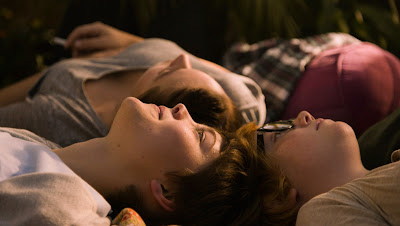Girls
Lost (2016): Written by Jessica Schiefauer and
Alexandra-Therese Keining, directed by Alexandra-Therese Keining. Starring:
Tuva Jagell, Emrik Oehlander, Wilma Holmen, Vilgot Ostwald Vesterlund, Louise
Nyvall, and Alexander Gustavsson. Running Time: 106 minutes. Based on the novel of the same name by
Jessica Schiefauer.
Rating:
3.5/4
Girls Lost features a fascinating mix of
reality and fantasy. It’s depictions of
the horrors of high school years are brutal in their accuracy, yet its central
conceit of a group of teenage lesbians struggling with their burgeoning sexual
and gender identities revolves around a twist of the supernatural to push the
plot into motion, the sort of mix that seems off-putting at first, but
ultimately lends the film its own unique magic.
Kim,
Momo, and Bella, lesbians all, already carry the stigma of being “the outcasts”
for pretty much everyone in their town, but they cope as best they can by
tightly sticking together at all times, especially at school where it’s most
needed. Whenever they so much as enter
the building the entire tone of the scene shifts, making everything seem
vaguely threatening. I meant it when I
referred to these parts of the film as brutal- in one of the most chillingly uncomfortable
scenes I’ve watched all year, a group of particularly aggressive guys in their
gym class separate one of them, push her against a wall, and try to force her
to undress for them. And if you think
any of the teachers would come to their aid, even in clear cases of assault, you
can forget it.
When
not in School Survival Mode, they spend most of their time in a greenhouse, where
they tend to all manner of flowers. In a
shipment of seeds, they find a strange one without a label, and decide to find
out what it is. It proceeds to fully
sprout into a large, black flower that very night, and upon examining it they
find that the flower excretes an oozy, vanilla-smelling liquid, which, when
consumed, physically transforms them into boys for the course of a single night,
allowing them to wander the town totally unrecognized by their classmates.
Momo
and Bella find this bizarre turn more amusing than anything else, a way to have
some fun at parties without being noticed or attacked, but for Kim, their first
night as boys about town touches something deep within her, something she’d
previously only suspected was there.
After befriending another boy from their school while transformed (it’s
made clear later on he does not recognize her when she’s a girl), she also
starts to wonder if she has feelings for him, throwing everything she thought
she knew about herself right up in the air.
Is she a girl or a boy?
Homosexual or straight? How can
she possibly find out?
The
swirling emotional complexities of the changes wrought on them all through this
strange plant are captured expertly by a brilliant bit of double-casting; the
girls themselves are solid enough, but are further supplemented by the boys
that play their male versions, who perfectly mimic their respective physical
tics or speech patterns, and even resemble them enough that you can immediately
note who’s who.
There
is no explanation for the plant- what it is, where it comes from, how its
powers work, and why it suddenly starts to die halfway into the film- which
will annoy some, but since this is a character-driven piece about the struggles
of adolescence in general and one person’s crisis of identity specifically,
worrying about this is missing the woods for the trees. What I did have a problem with was a few
moments in the third act where a few of the people start to act in ways
entirely out of character, seemingly without motivation to do so, but
thankfully they don’t derail what is otherwise a very powerful ending
Witnessing
Kim’s journey of personal discovery is agonizing, painful, and wonderful all at
once, capturing so many of the moments of intense emotion growing up brings
that can’t be put into words. They can
only be seen, or heard, or borne out in quick looks and small gestures, and it’s
a mastery of the smallness of some of the defining moments of our growing years
that make Girls Lost a special bit of
filmmaking. Highly recommended,
especially for those who’ve struggled or still struggle with their own gender
identities.
-Noah Franc

No comments:
Post a Comment